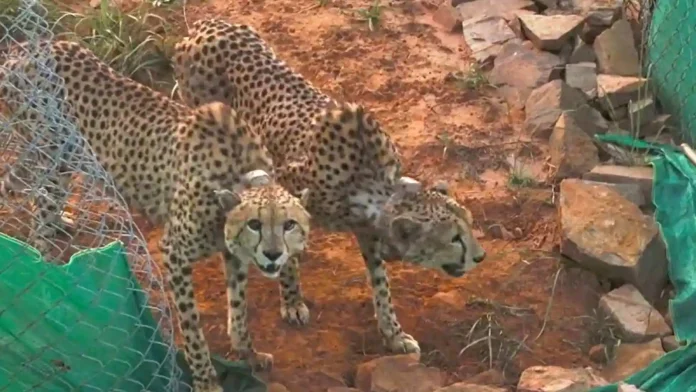An Air Force aircraft carrying the cheetahs landed at the Gwalior Air Force base at 10 am. They will nowbe taken to Kuno National Parkin helicopters.
New Delhi/Gwalior: Twelve cheetahs from South Africa arrived in Madhya Pradesh today, months after eight big cats had been ferried from Namibia.
An Air Force aircraft carrying the cheetahs landed at the Gwalior Air Force base at 10 am. They will now be taken to Kuno National Park in helicopters.
The cheetahs – seven males and five females – will be released into their quarantine enclosures at the Kuno National Park by Madhya Pradesh Chief Minister Shivraj Singh Chouhan and Environment Minister Bhupender Yadav.
For the first time in history, South Africa will be translocating 12 cheetahs to India as part of an initiative to expand the cheetah meta-population & to reintroduce the mammals in the country.#SACheetahstoIndia pic.twitter.com/HvKpEHUDBa
— Environmentza (@environmentza) February 17, 2023
10 quarantine enclosures have been created at the reserve for the big cats, officials said. As per Indian wildlife laws, the animals are required to be kept in isolation for 30 days after arrival in the country.
Last year in September, eight cheetahs from Namibia were flown in to India. Prime Minister Narendra Modi had released the big cats to the Kuno National Park on his birthday – September 17.
The eight Namibian cheetahs are now in a hunting enclosure – a six square km-area where they can interact with each other – and will soon be released into the wild.
The relocation of 12 cheetahs from South Africa comes three years after the idea was mooted by the Centre – the world’s first intercontinental translocation project that aims at reintroducing the big cats in the country.
The last cheetah died in India in1947, and the species was declared extinct from the country in 1952.
Efforts to reintroduce the animals gathered pace in 2020 when the Supreme Court ruled that African cheetahs, a different subspecies, could be brought into the country at a “carefully chosen location” on an experimental basis.
According to the project, around 12-14 big cats that are ideal for establishing a new cheetah population would be imported from South Africa, Namibia and other African countries as a founder stock for five years initially and then as required by the programme.






